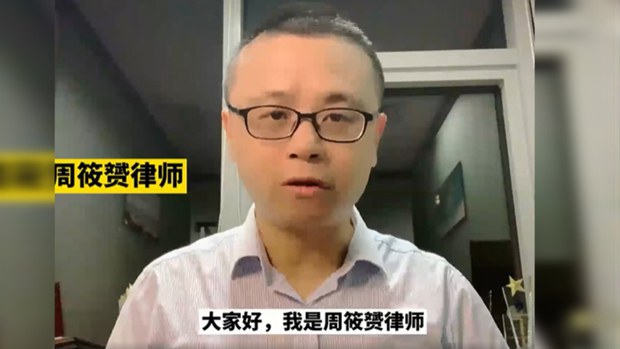Rights lawyer Zhou Xiaoyun, who formerly worked as a senior editor at the cutting-edge Southern Metropolis Daily newspaper in Guangzhou, remains incommunicado after being held under “residential surveillance at a designated location (RSDL),” RFA has learned.
Zhou was initially detained by police in the northeastern province of Liaoning around six months ago on suspicion of “picking quarrels and stirring up trouble,” a charge frequently used to target peaceful critics of the ruling Chinese Communist Party (CCP).
He was held incommunicado under RSDL, but now that the six-month limit has been reached, he is now likely being held under criminal detention on the same charges, people familiar with the case told RFA.
“According to the information that emerged [on Aug. 29], he is being held under criminal detention now,” journalist Hong Tao told RFA. “Somebody is taking the opportunity to deal with him in the current political and law enforcement climate.”
“It’s likely to be an official in the local government in Panjin going after him,” Hong said. “They are just trumping up some charges to pin on him, and they’ve just changed the kind of compulsory measures he is under to criminal detention.”
“That’s the way the judiciary operates, especially in the northeast and places like that,” he said. “They just lock someone up and deprive them of visits from their lawyer.”
“It’s pretty shameless, as the saying goes.”
Zhou’s lawyer Zhao Cong declined to comment when contacted recently by RFA.
However, sources said she has applied for bail for Zhou, and that the application has been rejected by the Panjin municipal police department.
Local retaliation
A former colleague of Zhou’s at the Southern Metropolis Daily, who gave only a surname, Liu, said the local police department and state prosecutor’s office are targeting Zhou because he accused them of abuses of power.
“This is totally about the local political and legal affairs committee retaliating [against him],” Liu said. “Now that he’s been converted from RSDL to criminal detention, it looks likely that he’ll be sentenced.”
“He ran afoul of some local vested interests, so the police are dealing with him.”
Guan Changbo, CCP secretary of the Liaoning provincial police department’s criminal investigation bureau, has written a defense of Zhou’s arrest.
An anonymous senior reporter said that the current political climate harks back to political turmoil of the Cultural Revolution (1966-1976), when public denunciations of intellectuals and professionals were rife, and were usually followed up with political or violent retribution.
Southern Metropolis Daily founder Cheng Yizhong said the fact that police in Liaoning felt comfortable detaining someone who used to be a journalist in a far-off city showed how much law enforcement power is now being delegated to local authorities under CCP general secretary Xi Jinping.
“The CCP is delegating a huge amount of authority to local governments now,” Cheng said.
“In the days of [former presidents] Hu Jintao and Jiang Zemin, it would be unheard of for a county-level police department to just arrest someone on a pretext like ‘picking quarrels and stirring up troubles’.”
An official who answered the phone at the Panjin municipal police department declined to comment when contacted by RFA last week.
“I don’t know the specifics of every case, and this is too detailed,” the official said. “If this is about the Liaoning provincial police, then I may not be able to answer you.”
‘Re-educating’ the media
The CCP is in the process of “re-educating” its already tightly controlled state media, requiring hundreds of thousands of journalists to sit an exam on the political thought of general secretary Xi Jinping to qualify for a new generation of official press cards.
The process started with a 2014 requirement for journalists to study Marxism, and followed up by Xi in 2016, when he warned during visits to state media organizations that state media are part of the CCP family.
All media operating in China must safeguard the authority of the Communist Party central committee, and adhere to “the correct direction” in forming public opinion, Xi said at the time.
State-sponsored “investigative journalists” are now required to be fully paid-up party members in good standing, ahead of any professional considerations, and genuine investigative journalism — already a risky profession even a decade ago — has now disappeared entirely, industry insiders have told RFA.
Many journalists trace the rot back to January 2013, when an op-ed article in the formerly cutting-edge Southern Weekend newspaper was forcibly expunged before publication, transforming a call for constitutional government and freedom of expression into a paean to the ruling party, and sparking a journalists’ strike and days of street protests.
Tuo Zhen, the propagandist who penned the replacement editorial, was recently promoted to editor-in-chief of CCP mouthpiece the People’s Daily.
China now ranks bottom in the world in the Reporters Without Borders press freedom index, and had the largest number of journalists behind bars, according to a 2020 report by the Committee to Protect Journalists (CPJ).

